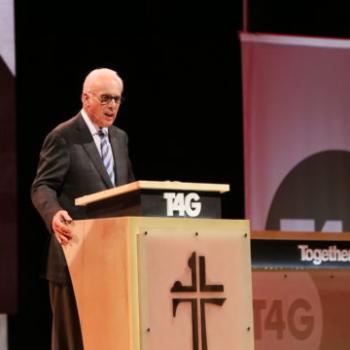That's why preaching must involve justice, because God is realigning power in every form. Having given us freedom, God hopes that our use of that freedom is for the sake of the world, creation, and our neighbor, and if it's not doing that, it is a fundamental problem. One of the most profound struggles in the biblical narrative is the relationship between God's power and our power. God gives deference to our power and yet God calls and makes a way for us to lay down our power and our rights to arms and to live out a discipleship that rightly orders power in the world, which defines worship, my relationship with my neighbor and with creation.
In my life, I stumbled into people who had a big gospel. It was why I was drawn to John Stott because on one hand he was orthodox, English, upper-class, and privileged but his life and vision for the world was so much greater than those categories and I wanted to know how that had happened. This is why I went to Fuller Seminary, which at the time was embroiled in a battle for the Bible. It was the most global seminary in the world and I wanted to be in a place that had big space and was wrestling with big questions. And being a pastor in Berkeley was attractive for that same reason; it is a place with unbelievable oxygen and it was possible to be deeply rooted in Christ and highly responsive and engaged with the neighborhood and the world.
What do you see as the biggest struggle for new preachers?
The biggest part is just getting over themselves. Effective preaching is so clearly not about the preacher. And the beginning preacher is often about the preacher. The tricky part is that you have to get over yourself to be yourself. So when you feel self-consciousness due to either over-confidence or lack of confidence, you need to know that's a growth trajectory everyone has to go through. There's a growth and maturation process that we must go on. Just as Jesus said, when we lay down our selves, we find we have something to say and we are able to say it with greater joy, abandonment, and zeal.
How do you preach for transformation and movement toward justice (without being preachy or moralistic)?
I think the heart of preaching is the heart of God. It's not the tasks of God. Moralism comes when we reduce it to a to-do list. When justice becomes something to do, then preaching becomes moralization. If justice is actually the embodiment of the heart of God in which the expression is the work of justice, then we get there in a different way. I'm not doing an externalized act, I'm embodying what is fundamentally an internal reality. It's an expression of God's character, not something on my to-do list. My agenda is to be just in an unjust world, asking where I'm going to give my time, resources, and energy to address injustice. You do that by inviting people into the heart of God. Whatever portion of scripture you are talking about, it's meant to be inviting people into the love of God for the world. As we understand the full nature of that, it's going to push and realign us. Preaching is having public enthusiasm for that process.
Cornel West says that "justice is what love looks like in public." That is a marvelous definition and even more so if you were to say, what does that look like in the character of God? So, I want to point people to that and speak about my heart's wrestling with the discomfort as I am moving deeper into the heart of God. I want to invite people into experience that has a seminal encounter with God. So justice isn't just wedded to action, it arises as an act of worship, otherwise it's an agenda and then potentially a fad. If it arises as a response to a God of justice whose total heart sees, engages, and serves, then I and the people I serve are invited into a different place that, in my view, is much riskier, much more integrated, much more sustainable, marshaled by what it is and isn't. I'm not the rescuer or messiah—I worship the God who is the Messiah. I am not surprising God, it's all in his sight. I'm joining with what's in God's heart.
What is your process of preparation for a sermon?
I think of preaching as a very long conversation, a sustained ongoing conversation with a community, and that conversation happens in and through the text. At any given moment as a pastor, I had a five-year plan for preaching that involved the whole of the biblical canon. That plan was nuanced by what is happening in the world, in the community, and in the liturgical calendar.
So I was thinking about what I was going to preach sometimes a year or two before I even got to it, because it was in my long-term vision. Long before I was preparing or breaking anything down, I was soaking in the text, reading it over and over again for months before I ever came to it in order to really internalize it. So before I even begin, I could talk aloud without notes and tell you a lot about that book or section of the book. It's become very conversational to me. I have the whole thing in my mind, the arc of the text.





